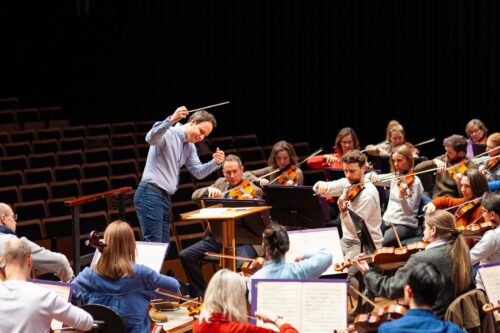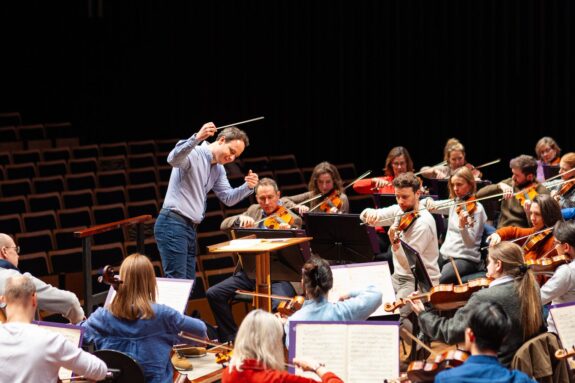 United Kingdom Vasks, Grieg, Sibelius: Louis Schwizgebel (piano), Bournemouth Symphony Orchestra / Gergely Madaras (conductor). Lighthouse, Poole, 19.2.2025. (CK)
United Kingdom Vasks, Grieg, Sibelius: Louis Schwizgebel (piano), Bournemouth Symphony Orchestra / Gergely Madaras (conductor). Lighthouse, Poole, 19.2.2025. (CK)

Vasks – Musica Serena
Grieg – Piano Concerto
Sibelius – Symphony No.1
Three weeks ago the Bournemouth Symphony Orchestra’s string section opened the concert here at the Lighthouse with Rudolf Barshai’s version for string orchestra of Shostakovich’s searing Eighth String Quartet (review here); they were on stage again at the start of this bracing Nordic programme to perform Pēteris Vasks’s Musica Serena, a world away from the stark profundity of the Shostakovich work, but engaging and touching on its own terms.
Or maybe not such a world away: as a Latvian, Vasks is old enough to remember his country under Soviet rule before its Independence and must be keenly aware – along with the populations of the other Baltic States – of the aggressive expansionism of its giant neighbour. The title Musica Serena is borne out by the music’s luminosity and apparent simplicity, but as its lines weave in and out of each other one has a growing sense of tension – or rather, tristesse – that is part and parcel of it. Beginning and ending with high violin harmonics, the music has a chaste beauty shot through with a feeling of lament. Gergely Madaras, conducting without a baton, used his hands to draw out the surges of feeling; he plainly believes in the piece, and he seemed to have communicated his belief to the players.
Grieg’s Piano Concerto is a wonderful work, and Louis Schwizgebel’s performance was warmly received by the Lighthouse audience. I have to confess that in the opening few minutes I found his playing rather pedestrian and his expression flaccid: aiming, perhaps, for poetic inwardness rather than the swashbuckling, sexed-up playing famously (or notoriously) delivered by Khatia Buniatishvili at the BBC Proms a few seasons back. Or maybe he was keeping his powder dry for the first movement cadenza, which he launched with Lisztian panache. He warmed to his task: the coughers were out in force in the slow movement, but the finale went with a swing. It sounds churlish of me, but I found more to admire in the playing of the orchestra than that of the soloist; Jesper Svedberg (cello), Eleanor Blakeney (horn) and Anna Pyne (flute) were well worth their solo bows.
After the interval, an uncommonly fine performance of Sibelius’s First Symphony. Last week in Bristol I had cause to admire the originality of the opening of Mahler’s First (review here) but Sibelius – Mahler’s contemporary and symphonic opposite – isn’t far behind. It is a truism that the influence of Tchaikovsky permeates this work, and that in opening with a gloomy clarinet solo Sibelius is aping Tchaikovsky’s Fifth: but Sibelius’s clarinet solo – played by Helen Paskins with brave spaciousness over a soft drumroll – conjures vastness as well as darkness: there is already an epic vision forming. When Madaras brought the strings in it was like a sudden blaze of light.
It is a symphony I love: in my youth I wore out Anthony Collins and the London Symphony Orchestra’s performance on LP, and my first live experience was from the Hallé in Leeds Town Hall, conducted by another Latvian (Arvid, the father of Mariss Jansons). Madaras evidently loves it too, and his conducting convincingly married energy and expressiveness, precision and passion. He maintained tension through the first movement’s lyrical episodes and made the interjections of brass and timpani properly dramatic. He brought the dynamics right down in the Andante, revealing the bell-tones of the harp (this performance made clear to me for the first time the importance of the harp in the symphony as a whole: along with timpanist James Bower, harpist Eluned Pierce received the loudest cheers at the end). Madaras’s careful balance ensured that the woodwind were always clear, and we were able to enjoy such details as a brief bassoon duet. The propulsive Scherzo vividly suggested galloping horses: a quiet bass drum roll menaced the leisurely Trio, and tuba blasts announced the return of the Scherzo material. Under Madaras, everything made its mark.
The epic finale brought more hallmarks of a composer, already celebrated in his native land, finding his symphonic voice: the driving energy familiar to us from En Saga and The Wood Nymph, both composed before the symphony; string playing sombre and spacious, or increasingly impassioned over a long pedal point; brass imposingly solemn and craggy. Madaras controlled – unleashed might be a better term – everything to perfection in a performance that made the music sound spontaneous, powerful, a natural force rather than a calculated process. It was truly stirring, and it was telling that the players all applauded him and insisted that he take a solo bow. Hungarian born, he seemed entirely at home in this repertoire; and he took the orchestra and the audience with him. I hope he will be back.
Chris Kettle
